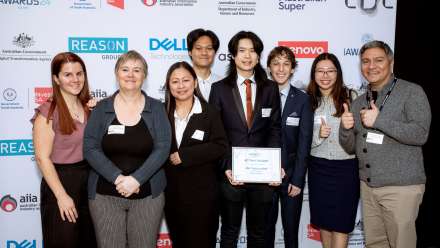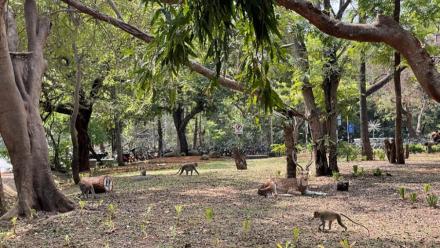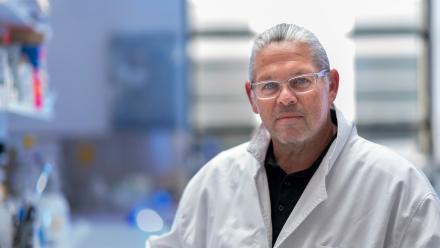VC's update – 50th anniversary of computing
Hello everyone,
Well, we've had our first frosts for the year this weekand I think I'll be composting the tomatoes and planting garlic. I love this time of year in Canberra, with the beautiful colours, crisp air, and transition to winter creating the aesthetic of autumn, which I find wonderful. It's the umami of seasons.
It's the 50th anniversary of computing at ANU - and last week we celebrated at a great dinner at the National Gallery of Australia with industry partners to reflect on how far we've come in 50 years. Our first computer course was in 1971 and attracted more than 200 students (which was a lot when the University was so small). We reminisced on the University joining World Wide Web in 1992 - one of the first 20 sites in the world to do so - and that ANU staff became the core of AARNet in 1989, making sure we have been way ahead of the NBN ever since. Computing science's first 50 years has made it one of the strongest programs in the world and we look forward to what the next 50 years brings - hopefully not the Singularity.
With the election campaign underway, ANU is again rolling out its annual Australian Election Study led by Professor Ian McAllister and the Social Research Centre. This study has taken place after every federal election since 1987 and households are selected at random to participate. It's an important study - it helps us track how Australians feel about our society and politics and shows how much the nation has changed since the 80s. You can read more about the study here.
Some of you may have seen the Australian Financial Review article sharing an exciting story of translation research coming out of ANU physics. Vai Photonics - founded by Dr Lyle Roberts, from the Research School of Physics, and James Spollard, from the Centre for Gravitational Astrophysics, - is being acquired bySydney-based robotic company Advanced Navigation. James just submittedhis PhD thesis two weeks ago and now, amazingly, he is part of selling a multi-million company! Vai Photonics' world-leading technology uses lasers to precisely monitor where objects travel without the need for GPS. Based on the absolute basic research of gravitationalwave detection - it is yet another reminder how the innovation ecosystem actually works. Already there are talks underway with NASA to use the technology on the next moon landing, but this technology has the potential to become ubiquitous in our lives.
A reminder that the 2022 Academic Promotions round will be open from 1 June to 31 July this year. HR will be hosting a series of information sessions for you to attend for more information. I would encourage you to attend these sessions if you are thinking about applying for a promotion. I would also encourage supervisors to attend as well. There will be an all-staff session (levels B-E) on Tuesday 17 May on Zoom; an all-staff session (level B-E) in person on Wednesday 18 May, and a women-only session for all academic levels in person on Thursday 19 May. You can register here.
As I finish writing this blog, I am off to join Aunty Anne Martin and the Tjabal Centre for lunch with Professor Asmi Wood, Professor Steven Roberts and the National Indigenous Australians Agency (NIAA) graduate program students. The program provides Indigenous staff in the public sector the opportunity to study at ANU and receive tertiary qualifications. The ANU College of Business and Economics has run the program with NIAA since 2021 - we had more than 20 students graduate last year and we have 30 going through the program this year. I'm looking forward to chatting with the students and hearing how their courses are going.
I am also pleased to announce the NIAA Deputy CEO Letitia Hope will deliver this year's ANU National Reconciliation Week Lecture on Friday 3 June.
To finish off, yesterday I had the pleasure of judging the Bake your PhD competition - a culinary experience and an opportunity for PhD candidates in the Research School of Earth Sciences to showcase their research and work using the art of baking. It's one of my favourite events of the year. I even baked my own thesis as part of the event in 2018. There was some outstanding baking that did a great job of showcasing PhD candidates' work. Congratulations to Alysha Jones who took home the top prize with amany-many layered cakerepresenting the levels of sediment found in a Lake George core sample. It looked impressive,showcased her thesis and tasted really good!
Brian


